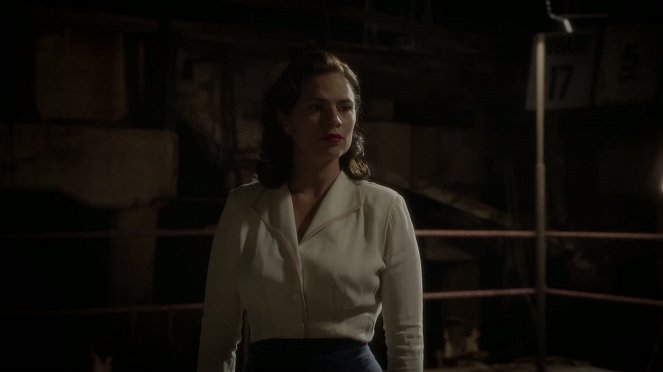Cinematography:
Edward J. PeiComposer:
Christopher LennertzCast:
Hayley Atwell, Chad Michael Murray, Enver Gjokaj, Dominic Cooper, James D'Arcy, Lyndsy Fonseca, Shea Whigham, Kyle Bornheimer, Meagen Fay, Bridget Regan (more)VOD (3)
Seasons(2) / Episodes(18)
Plots(1)
In 1946, Peggy Carter is relegated to secretarial duties in the Strategic Scientific Reserve (SSR). When Howard Stark is accused of treason, he secretly recruits Peggy to clear his name with the help of his butler, Edwin Jarvis. (official distributor synopsis)
Reviews of this series by the user Matty (1)
Marvel's Agent Carter (2015)
The makers of Agent Carter could not have chosen a better space-time for an outwardly feminist series than post-war America, where the “feminine myth” was born (each episode begins with an allusion to women gaining a more dignified status during the war). However, the advocacy for feminist ideas is really very much external and what the characters say does not entirely correspond to their narrative functions. Especially during the last few episodes, it is impossible to shake off the impression that the series revolves more around Howard Stark (on whose authorisation Peggy acts) and (the absent) Captain America. The frozen Steve Rogers, to whom the heroine is eternally devoted, also serves as a measure against the objections that Peggy does not have a relationship and lives only for her work. She mostly achieves success by, in the manner of men, putting her profession above her feelings and family (which she apparently doesn’t have at all, or at least we don’t learn anything about them). As if an intelligent, always perfectly groomed and sexy woman of action couldn’t simultaneously be a woman with a rich inner life (which is what most of society actually thought at the time, but in this case it is the attitude of the series rather than a reflection of society’s attitude). Paradoxically, it was only in the army and when she was at Rogers’s side that Peggy could be herself and not pretend to be a silly secretary. The nostalgia for old values such as honour and justice is also a yearning for the ideal man, who is unmatched by any of the cowardly drones who surround the protagonist through most of the series. Peggy’s exceptionalism thus partly arises from the ineptitude of the men she collaborates with. Compared to the extremely compliant Jarvis, an exception is the crutch-bound Agent Sousa, whose parallel story of gaining respect makes it apparent that womanhood was previously – and still is – perceived as its own kind of handicap. The elevation of aggression, a typically masculine character trait, to the main threat in the last episode, or the drawing of attention to the common practice of giving men most of the credit for a job successfully done, can also be taken as a subversive innuendo. These small details, however, do not salvage the clumsy attempt to incorporate feminist ideas into a macho superhero narrative. If Peggy had been rewritten as a man, it wouldn’t even have been necessary to make any major changes to the plot (we would perhaps only be more surprised by the shoddy characterisation of the protagonist and the flawless nature of the character), which I believe is not indicative of any great perceptiveness toward the “plight of women” on the part of the creators. 70%
()

